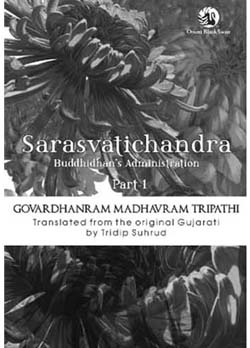Hailed as a landmark literary work, a milestone in the literary history of Gujarat, Sarasvatichandra, Govardhanram Tripathi’s magnum opus is now available in English translation after an astounding 128 years of its publication in Gujarati. Now when it has been published in Hindi and English, the two link languages of India, what implications could it have for present-day Indians? It is but natural for two questions to arise in the mind of the discerning reader. Firstly, why was it not translated for these many years? Secondly, (coincidently, all the four parts of the novel have been published in Hindi translation at this very juncture), why has it been published in English translation after these many years? Answers to these questions are not easy to locate but must be addressed and contextualized by scholars and researchers working in this area.
This is how the novel is introduced on the blurb: ‘A novel of epic proportions, written in four parts from 1887 to 1901, Sarasvatichandra is both an enactment and the embodiment of the life philosophy of one man, and his sole mission . . . Written sixty years before Independence, the novel holds up a fascinating mirror to Gujarati society of that time, the joint family, particularly the role of women, and life in the Princely States, against the backdrop of a nation in transition at the turn of the century—culturally, politically, and ideologically.’ This should be enough to give the reader an idea about the status of a classic that the novel continues to enjoy.

